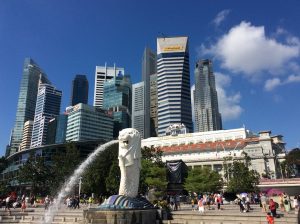The findings of the Tax Working Group are in and (unsurprisingly) the recommendations lean heavily towards introducing a full blown capital gains tax (CGT) into New Zealand from 2021. About the same time, the Prime Minister fronted with her first economic speech of the year in which she clearly signaled that the next budget will be focused on “well being”. Only a very cold-hearted person could deny this is much needed, but there are huge political risks attached to both these initiatives.
Lifting the economic, social and mental well being of youth seems to be front of mind for our government. Quite rightly so, young people are our future. Growing an increasingly impoverished and disenfranchised group in society is in nobody’s interest at all. But equally, ignoring economic realities and the role of business in society is a dangerous road to tread. Young people need jobs and hope and we cannot deliver this in a shrinking economy. The government must continue working on the infrastructure deficit and especially deliver on intelligently supporting economic growth in the regions, where there are many latent opportunities.
This point is important because youth unemployment and social needs are high in our rural areas, smaller towns and cities. Interestingly, farms, small businesses and family owned property holdings are likely to bear the brunt of a full CGT. Not exactly a recipe for economic growth in the provinces. But I think we all know that a comprehensive CGT is unlikely. The political risk is enormous and even the most optimistic of economists agree that, although beneficial in the long term, CGT will crush economic growth – at least initially. So the government needs to be ready to take that one on the chin.
A small blip in the economy could be weathered perhaps, but keep in mind that we are not a high growth economy in the first place. Forecasts (without considering CGT effects) place New Zealand at about 2% growth, compared to 3% average globally forecast for next few years. During my recent visit to Singapore, I noticed there was much hand-wringing in the media that their GDP growth had dropped to 7%! We are not in such an envious position and even a small drop has huge implications on tax revenues, thus cancelling out the resources for “well being” projects.
Another worry is the looming threat to businesses owners. Those who invest time and capital into growing their businesses may now be penalised when they come to realise gains from their efforts. Taxing habitual property traders and business that impact the environment is certainly something we should do, but taxing entrepreneurs for employing people, paying GST and income tax while strengthening the productive part of the economy, is a very bad idea.
Companies that produce high value “weightless exports” such as software are likely to be disproportionately penalised because these ventures tend to be started with minimal shareholder capital investment. Therefore almost all of the value at time of disposal will be subject to taxation. No doubt the government has an eye on the tsunami of baby boomer business owners that will be exiting in droves over the coming years. But who will replace them? In a world with an uncertain economic future, the current no-CGT regime on sales of business assets is one of New Zealand’s few competitive advantages.
Paul Spence is a commentator and serial entrepreneur, a co-founder of New Zealand based technology ventures iwantmyname and Creative Forest and a mentor with Startup Weekends and Lightning Lab. You can follow Paul on Twitter @GeniusNet or sign up for a free weekly digest of startup, tech and innovation related events curated by him through New Zealand Startup Digest.

 If you are a fan of romantic comedies you may recall a scene in last year’s hit movie Crazy Rich Asians in which friends join the happy couple at an outdoor food centre for an evening of laughs, beer and Singaporean food. Amerasian Rachel is trying her best to fit in but is caught off guard by a particularly spicy mouthful of Laksa, much to everyone’s amusement. In some ways this typifies the visitor experience in Singapore. At first it can be hard to find your place in the cultural melange, but there are surprises around every corner and people are friendly once you’ve been properly introduced – so it’s very much worth persisting.
If you are a fan of romantic comedies you may recall a scene in last year’s hit movie Crazy Rich Asians in which friends join the happy couple at an outdoor food centre for an evening of laughs, beer and Singaporean food. Amerasian Rachel is trying her best to fit in but is caught off guard by a particularly spicy mouthful of Laksa, much to everyone’s amusement. In some ways this typifies the visitor experience in Singapore. At first it can be hard to find your place in the cultural melange, but there are surprises around every corner and people are friendly once you’ve been properly introduced – so it’s very much worth persisting. Having
Having 
 Australian Prime Minister Turnbull’s recent flying visit to New Zealand, to meet our new PM Bill English, was a considerably more civil affair than Turnbull’s reportedly heated conversation with the “so called” U.S. President the previous week. Perhaps that is why the visit went under-reported in the media. Neither Prime Minister could be regarded as a stellar charismatic, but perhaps that’s not such a bad thing. In these unenlightened times, a safe pair of hands with good diplomatic skills and a head for business is a far greater asset. Strengthening regional economic linkages will be key to survival in an uncertain world.
Australian Prime Minister Turnbull’s recent flying visit to New Zealand, to meet our new PM Bill English, was a considerably more civil affair than Turnbull’s reportedly heated conversation with the “so called” U.S. President the previous week. Perhaps that is why the visit went under-reported in the media. Neither Prime Minister could be regarded as a stellar charismatic, but perhaps that’s not such a bad thing. In these unenlightened times, a safe pair of hands with good diplomatic skills and a head for business is a far greater asset. Strengthening regional economic linkages will be key to survival in an uncertain world.
 A recent article in the Washington Post implored society to
A recent article in the Washington Post implored society to 
 Bernard Hickey’s curious
Bernard Hickey’s curious